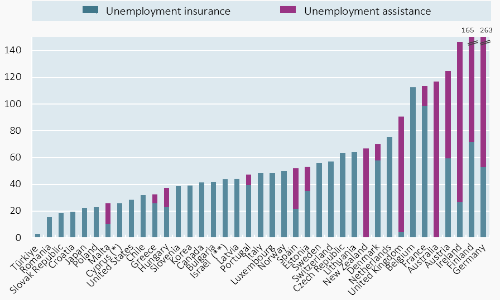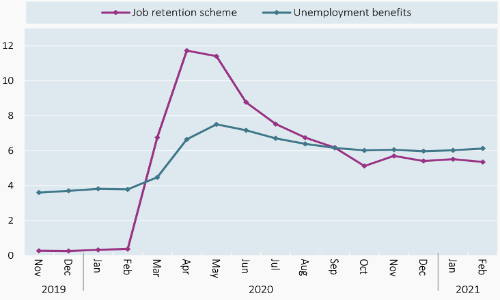Social policies and data
Social Benefit Recipients (SOCR) Database
|
|
Across the OECD area, income assistance for working-age people has accounted for much of the resources devoted to COVID-19 emergency packages. Reform pressures will persist as temporary support measures expire, as government budgets deteriorate, and as incomes recover. Government transfers shape households' ability to cope with crises, and to make the most of dynamic labour markets. Accessible social protection is also a key objective in countries' commitments to the Sustainable Development Goals. The OECD’s Social Benefit Recipients Database (SOCR) provides unique comparable information on the number of people receiving cash benefits across countries, including data for the main income replacement benefits and top-ups: Unemployment, social assistance, disability, old-age, in-work benefits / job-retention schemes, as well as rent allowances. |
Annual Data by Country
Access comparative data going back to the mid-2000s  Note: The figure shows 'pseudo-coverage' rates for unemployment benefits (download the figures of the chart here). See full SOCR database for details. |
SOCR High-Frequency Data
Access the SOCR-HF Data Explorer  Note: Recipients in % of working-age population before and after the start of the COVID crisis. Average across 15 OECD countries. Click on the figure to browse or download the latest monthly data by programme and country. |
Related databases and tools> OECD Social Expenditure database (SOCX)> OECD Tax-Benefit model and policy database> OECD database on Labour Market Programmes (LMP)> EUROSTAT database on Social Protection (ESSPROS) |
Related studies and results> De-facto gaps in social protection for standard and non-standard workers: An approach for monitoring the accessibility and levels of income support (SEM Working Paper #271, online annexe table B)> Can disability benefits promote (re)employment?: Considerations for effective disability benefit design (SEM Working Paper #253)> How reliable are social safety nets?: Value and accessibility in situations of acute economic need (SEM Working Paper #252)> Employment Outlook 2020 chapter 1: COVID-19 From a health to a job crisis> Employment Outlook 2019 chapter 7: Left on your own? Social protection when labour markets are in flux> Employment Outlook 2018 chapter 5: Unemployment-benefit coverage: Recent trends and their drivers> Society at a Glance 2019 chapter 6: Equity indicators (Out-of-work benefits)> OECD Policy Responses to Coronavirus : Supporting livelihoods during the COVID-19crisis: closing the gaps in safety nets> OECD Policy Responses to Coronavirus : Paid sick leave to protect income, health and jobs through the COVID-19 crisis> OECD Policy Responses to Coronavirus : Job retention schemes during the COVID-19 lockdown and beyond> Measuring Distance to the SDG: Target 1.3 implementing nationally appropriate social protection systems> Are Recipients of Social Assistance ‘Benefit Dependent? (SEM Working Paper #162)> Safety Nets and Benefit Dependence (Research in Labor Economics series) |
|
The OECD Social Benefit Recipients (SOCR) database and related analytical reports have been produced with the financial assistance of the European Union Programme for Employment and Social Innovation “EaSI” (2014-2020). The views expressed herein can in no way be taken to reflect the official opinion of the European Union. |
|
||
Related Documents

 Contact
Contact